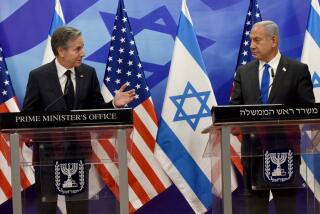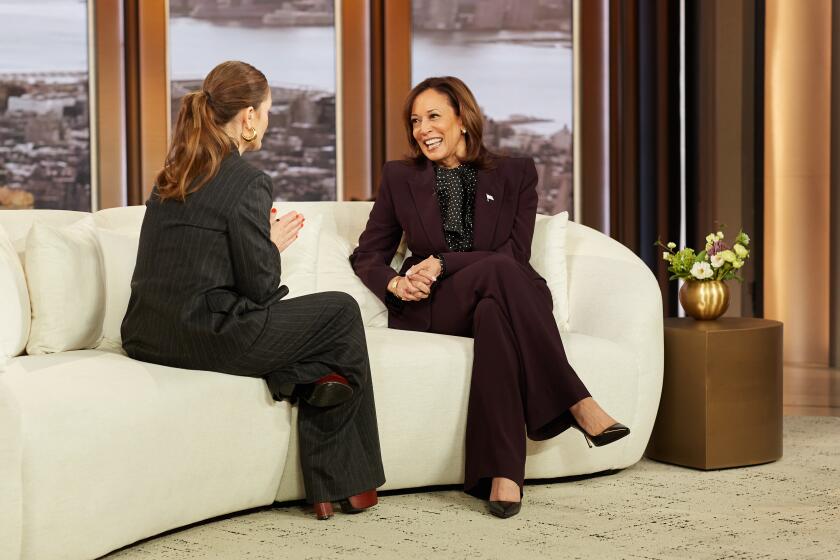U.S. Dangles a Carrot: Opportunities in Iraq
To press its new Iraq initiative, the United States is crafting a strategy to isolate France and entice other countries to commit new troops and funds by offering them the prospect of an active role in the transition and after the U.S. returns political control to Iraqis, according to officials.
U.S. officials are engaged in behind-the-scenes discussions with U.N. Security Council members as well as potential donor countries about taking charge of one or more of the 14 critical areas for reconstruction recently identified by the World Bank and the U.S.-led provisional authority in Baghdad.
“We’re telling them that this is not just about writing checks or sending troops, but about having a stake in Iraq so their government agencies and humanitarian groups are involved in a sector when a new sovereign government is in power in Iraq. It’s a way to get in on the ground floor. That’s the selling point,” said a well-placed U.S. official who requested anonymity.
Bush administration officials are counting on two international forums, scheduled in the next six weeks, to jump-start the new U.S. strategy: the opening session of the U.N. General Assembly, Sept. 22-26, and an international donors conference in Madrid, Oct. 23-24.
In the meantime, the administration hopes to isolate France to prevent it from thwarting Washington’s effort to win a new U.N. resolution and repeating what happened on the eve of the Iraq war. France’s threat then to veto any resolution authorizing war against Iraq ultimately forced the United States to lead a coalition without world support.
“France was the ringleader of the opposition last time. Our goal is to ensure it doesn’t happen again,” the official said.
The critical first step in the interrelated efforts -- to win passage of a new resolution calling for a greater international role in Iraq and to garner specific commitments, both financial and military, from other countries -- will play out this weekend in Geneva. The foreign ministers of the five permanent members of the Security Council -- the United States, Britain, China, France and Russia -- will meet for an unusual summit to discuss the controversial resolution proposed by the United States.
The administration is wary of the meeting, called by U.N. Secretary-General Kofi Annan to prevent the kind of divisions that earlier this year undermined both the credibility of the United Nations and the U.S. war effort, U.S. officials said.
Washington believes that support for its new resolution comes largely from the 10 elected members of the Security Council. This could make the Geneva meeting, with only the five permanent members present, appear as if the U.S. resolution does not have the backing the Americans believe it does. U.S. officials are also concerned that the French might try to rally Russia and China to make joint demands.
The administration is already publicly testy about France’s criticism of the resolution and the fact that the French have not discussed specific points or offered alternatives. U.S. and foreign officials involved in the process say the other major Security Council players -- including Russia and Germany, both of which stood against the Iraq war -- are at least willing to talk about the resolution or suggest modifications.
“France is isolating itself by the way it’s handling itself,” said a senior State Department official who requested anonymity. “The rest of us are working together well. It’s up to France to catch up with the rest of us.”
In a further sign of tensions between Paris and Washington, the State Department said it was stunned by France’s statement Tuesday threatening to veto a resolution that would lift U.N. sanctions on Libya. Lifting the sanctions is part of a deal to settle the 1988 bombing of Pan Am Flight 103 over Lockerbie, Scotland, including Libya’s payment of billions of dollars in compensation to families of the 270 people who died in the attack.
State Department spokesman Richard Boucher called the French threat “inexplicable” and “astonishing,” given that France had urged the U.N. in 1999 to lift sanctions after negotiating its own settlement with Libya for the 1989 bombing of a UTA flight that killed 170.
When Libya recently agreed to a much higher settlement for the Pan Am bombing, France demanded that its settlement be renegotiated -- and it now threatens to block a U.N. vote on the sanctions until Libya complies.
Though the government in Tripoli had not acknowledged responsibility for either bombing, Libyans were convicted of participating in them. U.N. sanctions were imposed in an effort to force the Libyan government to hand over the suspects for trial.
To ensure that the Geneva meeting does not backfire, U.S. officials are already downplaying expectations of significant developments. The foreign ministers will only “compare ideas,” not discuss specific changes to the resolution, and will examine how to generally support Iraqis as they begin to assume aspects of sovereignty, Boucher told reporters.
“The secretary-general felt it was good at this juncture, particularly with the General Assembly coming up and the Iraqi resolution on the table, to have a discussion with the Perm 5 [the five permanent Security Council members] and see if we can align the ideas a little bit more, get together not only in person, but get together conceptually on how to support the Iraqis,” he said.
Secretary of State Colin L. Powell will not take any new language or options with him to Geneva, U.S. officials said Tuesday.
After Geneva, the administration will lobby hard for its resolution and try to work up a full list of objections or suggestions. The United States is not likely to indicate what compromises might be considered until Powell and President Bush attend the opening week of the General Assembly session, U.S. officials said.
Bush is scheduled to address the General Assembly on Sept. 23. The U.S. hopes to get the Security Council to vote on the resolution during that week or soon after, the officials added.
More to Read
Get the L.A. Times Politics newsletter
Deeply reported insights into legislation, politics and policy from Sacramento, Washington and beyond. In your inbox three times per week.
You may occasionally receive promotional content from the Los Angeles Times.






